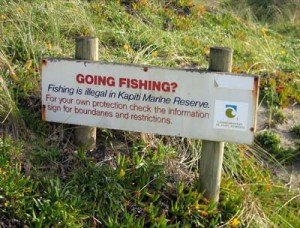Designating ecologically-poor slabs of the ocean — which miners and fishers don’t want — as marine protected areas (MPA) is “ridiculous” a major science journal, Nature, says in an editorial.
 “Good” MPAs such as those in Hawaii and around the Great Barrier Reef could bring great benefits, from saving individual species from extinction to preserving entire coral-reef or deep-sea ecosystems, but the journal said that balancing the recommendations of scientists with commercial needs and other interests “is always tricky for politicians”.
“Good” MPAs such as those in Hawaii and around the Great Barrier Reef could bring great benefits, from saving individual species from extinction to preserving entire coral-reef or deep-sea ecosystems, but the journal said that balancing the recommendations of scientists with commercial needs and other interests “is always tricky for politicians”.
It pointed to an article by Daniel Cressy, Ocean conservation: Uncertain sanctuary which noted criticism of the Australian government over its efforts at marine zoning. Publication of the item followed similar comments made earlier this week at an SMC briefing on the marine think tank which preceded this week’s International Congress for Conservation Biology – ICCB 2011 — in Auckland.
At the SMC briefing, Queensland University ecologist Hugh Possingham said that in Australia’s own marine reserves, there had been”significant progress”, with the Great Barrier Reef as the “gold standard”.
But subsequent planning for marine protected areas on other parts of Australia’s coast had not been as good, with a tendency for only small parts of the continental shelf not wanted by other interests such as petroleum explorers, miners or fishers to be included in reserves, he said.
Nature reported that the Department of Sustainability, Environment, Water, Population and Communities said that the Australian government “does not accept that there is a lack of protection for valuable habitat in the proposed marine reserves network,” but researchers argued there were ways to improve reserve planning.
“Many nations are now setting up MPAs using a software called Marxan, which uses an algorithm to calculate the areas that should be included in order to protect the most important habitat while minimizing the cost of the reserve”. Professor Possingham told Nature that the best approach basically amounted to saying “get me 10 per cent of everything and annoy as few people as possible”.
At the SMC briefing, Professor Possingham also suggested New Zealand had lost its leadership role in marine protected areas. “In the 1970s and 1980s, New Zealand was considered to lead the world in marine protected areas – there were a lot of reserves, there was a lot of discussion,” said Professor Possingham. “There was outstanding marine science, and yet clearly, in the mainland New Zealand waters, very little has happened in the last few years, and other countries have pushed ahead,” he said.